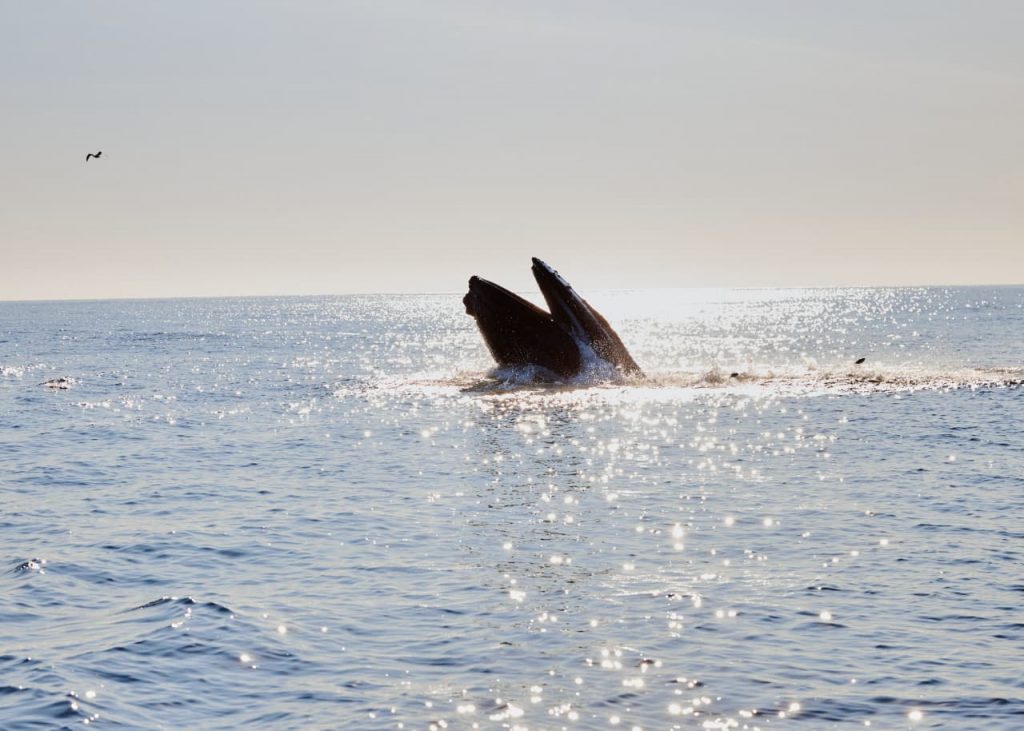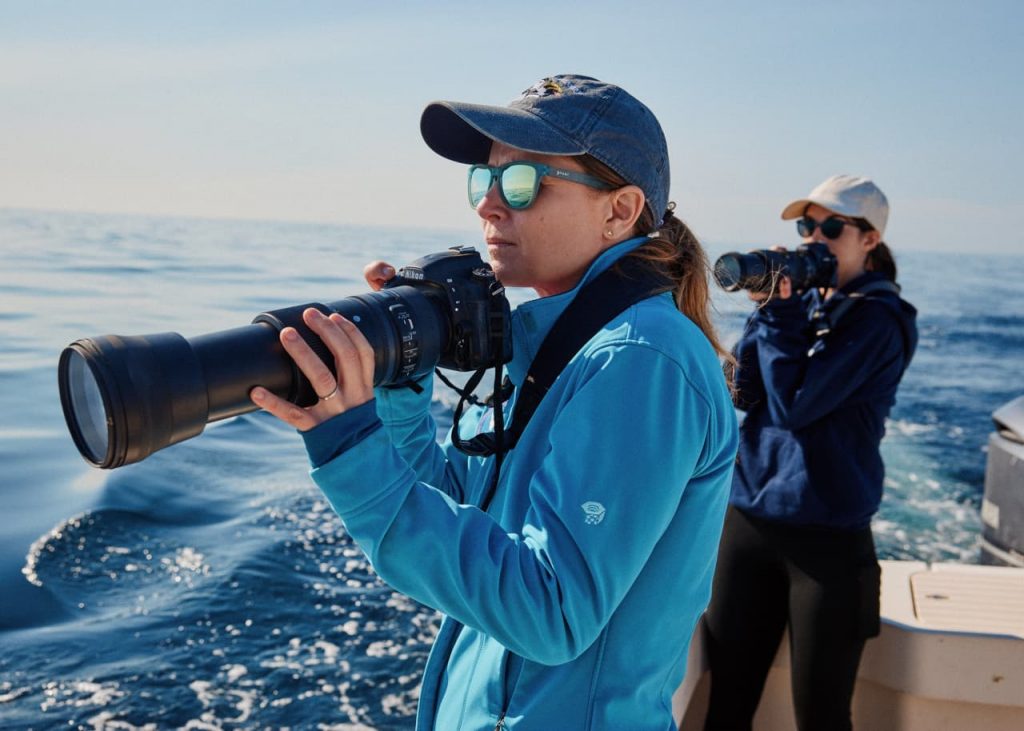Michael Shellenberger has spent years railing against renewable energy. A nearly extinct whale helped him build a coalition that has played a part in slowing the rollout of wind turbines up and down the East Coast.
Shellenberger, a self-described environmentalist who turned against renewable energy in favor of nuclear power, claims offshore wind farms will decimate the 360 right whales that remain in the North Atlantic.
Some of the activist groups in his coalition are backed by conservative and libertarian think tanks with close ties to the fossil-fuel industry. Shellenberger argues that the whales are killed by the construction of the giant turbines and the noise they generate during installation.
Many scientists don’t buy Shellenberger’s claims. Most right whale deaths are caused by collisions with boats, including those heading to the region’s increasingly busy ports , or when whales become entangled in lines from commercial fishing fleets, according to the National Oceanic and Atmospheric Administration. Most right whale injuries are caused by fishing lines, NOAA says.
Offshore wind turbines are seen as crucial for the energy transition. Turbines can rise nearly 900 feet above the sea with blades around 350 feet long that generate vast amounts of power.
Projects planned in the U.S. would power four million homes. Booming wind power in Europe has helped offset the reduction in natural gas coming from Russia.
Shellenberger has used the whales to get backing from local politicians, oceanfront homeowners and commercial fishermen. Members of his coalition have used their cash to sue wind companies, delaying the projects and adding to their already-rising costs.
“People love whales,” Republican Rep. Jeff Van Drew , who represents a coastal district in southern New Jersey, told the crowd at an August fundraiser for a group affiliated with Save Right Whales. “Those whales gave us the opportunity to get our message out.”
The right whale was easy hunting for whalers because it swims slowly near the shore. It typically floats when it is killed, making it easy to remove the blubber. Whalers told each other it was the “right whale” to hunt.
Shellenberger, a former public-relations executive, has his roots in the environmental and human-rights movements. In the mid-1990s, he joined a grassroots campaign to save California’s last unprotected old-growth redwood forest from commercial logging. Around 2006, he fought for a wind project off the coast of Cape Cod, which was opposed by Robert F. Kennedy Jr .
He has never stopped touting his credentials as an environmentalist. But he has become a big backer of nuclear power and has embraced increasingly extreme political positions.

A humpback whale breaks through the surface in the open ocean off the coast of Montauk on Long Island, N.Y. Photo: Bryan Banducci for WSJ
His recently established a Substack newsletter has become the most popular on the platform . One recent post was titled “The Censorship Industrial Complex,” on a phenomenon that he said is driving a global transition to totalitarianism. Last year he joined the University of Austin as the school’s CBR chair of politics, censorship and free speech to “facilitate the responsible exercise of free speech in a pluralistic society.” The startup school was founded to be an alternative to elite liberal-arts colleges.
“He’s kind of a social entrepreneur,” said Ted Nordhaus, who worked with Shellenberger on a 2007 book on environmentalism. “The things he most benefits, both financially and as a public figure, is just sort of outrage and clicks.”
Shellenberger wrote “San Fransicko: Why Progressives Ruin Cities” in 2021 and ran for governor of California in 2022. About 9% of his $1.25 million in campaign donations came from nuclear-energy advocates and the fossil-fuel industry, according to a Wall Street Journal review of 2022 political donations.
Some of Shellenberger’s collaborators disavowed him after he began playing down the impact of climate change. “He and I parted ways because I thought a lot of what he was saying wasn’t true,” said Kerry Emanuel, a Massachusetts Institute of Technology professor emeritus of atmospheric science, who was briefly on the board of Shellenberger’s pronuclear nonprofit, Environmental Progress, now known as Civilization Works.
Shellenberger declined to comment.
Before Shellenberger and the right whale showed up, opponents of wind projects were typically beachfront homeowners and businesses. They were worried that the towers would spoil their views and keep tourists away. The towers are generally far out to sea.
Local groups recruited Shellenberger to organize the fight against a New Jersey wind project, according to event listings and former group members. “The anti-wind community here, it’s got to be a single, united front against this monstrosity they want to build up and down the Atlantic coast,” Shellenberger said at a 2021 rally in Ocean City, N.J.
He tied renewable energy projects to environmental destruction and played down the risk of global warming. Then he invoked the right whale. “The one whale species—the North Atlantic right whale species—that’s really the most threatened species in the world is the one that’s most threatened by this wind project,” he said.
Later that year, local anti-wind groups began using similar language to promote a link between whale deaths and offshore wind projects, according to a Journal review of archived websites and Facebook groups.
Save Right Whales grew rapidly, publicly boasting nearly two dozen organizations and individuals as part of its network. The coalition isn’t a tax-exempt organization, so donations to Save Right Whales are routed through Civilization Works.
In 2022, Civilization Works received $20,000 from the George Mason University-based Mercatus Center, a free-market think tank that received millions in donations from the Charles G. Koch Foundation, according to tax records . Charles Koch and David Koch ran a fossil-fuel empire funding numerous efforts to undermine U.S. clean-energy policies.
Some members of Save Right Whales are supported by other organizations with deep ties to fossil fuels. In its infancy, a New Jersey-based coalition member, Protect Our Coast New Jersey, relied on the Caesar Rodney Institute, a libertarian think tank funded in part by a trade group representing the fossil-fuel industry, to handle donations, according to the group’s president.
Protect Our Coast and two other Save Right Whale members work with another group—the American Coalition for Ocean Protection—running a legal-defense fund to obstruct wind projects. Members of that coalition also received millions from Koch family foundations, tax records show.
Fossil-fuel funding makes up a fraction of Caesar Rodney’s overall donations, said David Stevenson, a director at the Caesar Rodney Institute and American Coalition for Ocean Protection manager. Shellenberger has done “excellent work” using his large Facebook following and media presence to draw public attention to whale deaths, he said.
In the audience at Shellenberger’s speech was Bonnie Brady, executive director of the Long Island Commercial Fishing Association, a group opposed to the projects because some planned sites overlap with fishing grounds .
“I was bouncing around like a ping-pong ball all up and down wherever the wind people showed up…. I’d be like, ‘Excuse me, what about the fishermen?’ ” said Brady.
Shellenberger agreed. “If I were the fisherman I would be worried…they go build the wind farm, the right whale species continues to suffer and then they restrict the fishing,” he warned.
Brady’s association and five other fishing groups are suing federal agencies to block a Massachusetts wind project. They are represented pro bono by lawyers from the Texas Public Policy Foundation, a think tank backed by oil-and-gas companies and other donors. A federal judge rejected the fishermen’s claims that the wind farm would hurt whales and their businesses. The case is being appealed.
Ted Hadzi-Antich , a senior attorney for the foundation, said, “We have evidence that shows the North Atlantic right whale is going to be put at greater risk of extinction because this area is so important for that species.”
After Shellenberger’s followers adopted the right whale, they set about doing research to prove it was at risk. They have focused on the construction of the wind turbines as the main cause of whale deaths. They blame the noise generated by undersea mapping activity and by pounding steel beams into the seabed.
Shellenberger produced a documentary last year showing a colleague cringing in pain while she listened to the sounds of wind-turbine construction on headphones.
“What caused these whales to hit the ships? They become deaf or panic when they hear this noise,” said Apostolos Gerasoulis, a onetime member of Save Right Whales and a Rutgers University computer science professor emeritus. He has overlaid the locations of whale deaths on maps of shipping traffic, which he said proves they were caused by wind activity. He focused on the deaths of humpback whales, which have died at higher numbers than right whales. His research hasn’t been peer-reviewed.
Those findings don’t show cause and effect, said David Wiley, a National Oceanic and Atmospheric Administration marine ecologist. He is an author of a May 2024 paper published in the journal Conservation Biology that found no link between humpback whale deaths and wind projects.
“I could correlate Nvidia stock with whale deaths, but no one thinks Nvidia is killing whales,” Wiley said.

Lesley Thorne and a doctoral candidate, Chelsi Napoli, waiting for a whale to resurface, with cameras in hand. Photo: Bryan Banducci for WSJ
His co-author, Lesley Thorne, a professor at Stony Brook University’s School of Marine and Atmospheric Sciences, said whale deaths in areas around wind projects largely rose before seabed-mapping surveys. Deaths in states with active offshore wind projects increased after turbines were already in the ground.
Wind companies say they are aware of the risk to marine life. They don’t operate when whales are nearby or passing through the area on their 1,000-mile migration from off the coast of New England to the southeastern U.S. every winter.
The protests and lawsuits have hit the offshore wind industry, which was already struggling with rising costs, higher interest rates and supply-chain-related delays. In the past year, half a dozen offshore wind projects were canceled or faced big financial risks.
Local opposition put extra pressure on Ørsted , a Danish company that abandoned two wind projects off the coast of New Jersey last year after members of Protect Our Coast, the Save Right Whales affiliate group, protested and lawsuits were filed against the company and government agencies. Ørsted blamed higher costs and permitting delays.
“These copycat groups all lawyer up and deploy this tactic,” said Paulina O’Connor, executive director of the New Jersey Offshore Wind Alliance, an industry-backed group.
Write to Shane Shifflett at shane.shifflett@dowjones.com


